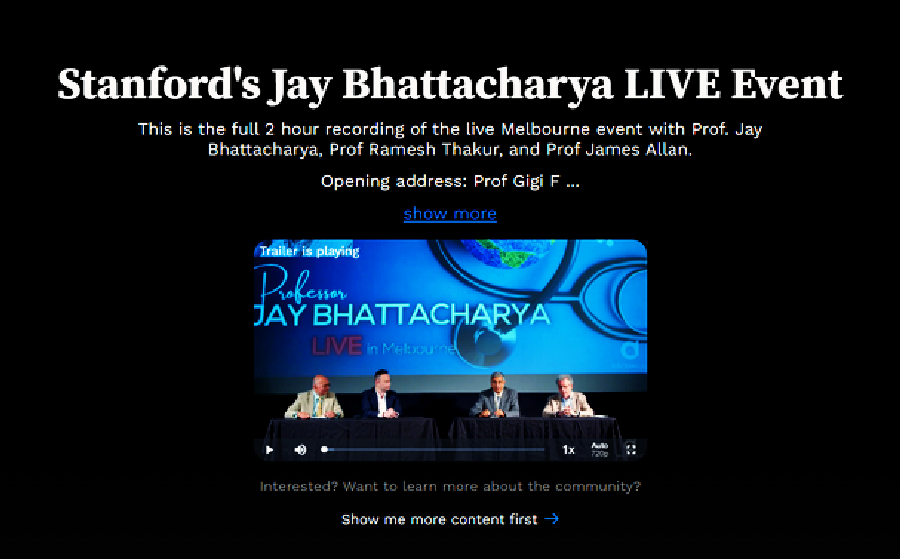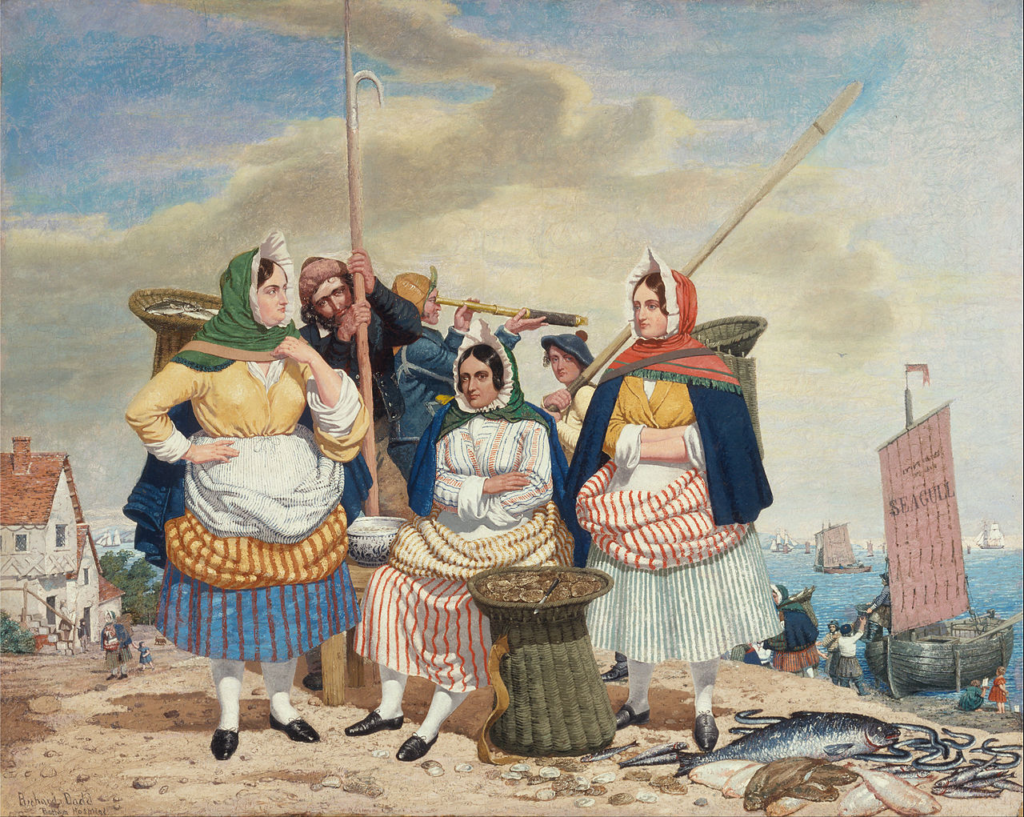By Paul Collits. Featuring the Art work of Richard Dadd.
Well, finally we have a review (of sorts) of the Covid policy fiasco in Australia. Not an official inquiry, as we suspect no government involved in erecting the Covid State and in dishing out the brutal policy instruments will ever be so principled as to do that. At least not a genuine inquiry.
No, this review was commissioned by a public health-embedded foundation (The Paul Ramsay Foundation, supported by two other foundations), overseen by a panel led by government and academic insider (Peter Shergold), and delivered by a team of (largely) young economists (the e61 Institute). So, not especially “independent” as claimed. Perhaps even controlled opposition. And certainly nothing too out-there recommended. Like the culprits behind lockdowns, lockouts and mandates being put on trial, Nuremberg Two-style. As many of us have wanted.
The review’s report was called Fault Lines (hereafter called the Shergold review) suggesting a focus – misplaced, I believe – on inequities that occurred in the Covid policy response. The review got some things right. It got other things horribly wrong. And it missed much. Most importantly, it focused its critique exclusively on the relatively safe ground of lockdowns. Make no mistake, these things were not just misplaced, but were evil. But what of the brutal and unnecessary vaccine mandates? Nothing to see here, it seems. If one accepts the approach of the review panel and its backroom economist research team. The worldview of the panel and researchers was extremely narrow. Hard questions were never asked. This is a review of the technocracy, in the worst sense of that term, done by the technocracy. And quite possibly done for the technocracy.
What the Shergold Inquiry Got Right: A Few No-Brainers
Were there positives in the Shergold-led review? Yes, there were, and these are important for the mainstream conversation about Covid policy. For there are many, many people who still think that it was all okay.
· The inquiry got it right on school closures, which it suggested were detrimental and unnecessary. These were indefensible decisions likely made at the behest of teachers’ unions which had seemingly little interest in the learning outcomes of their students and no knowledge of the nature and supposed dangers of the virus.
· The inquiry also identified the obvious inequities associated with the largesse doled out by governments in order to keep the punters happy. But the inquiry falls short of asking the big question – were the handouts bribes, and so part of the orchestrated “psyop” conducted by governments and their corporate partners that was Covid policy? Make the troops scared. But also reward them for their fear. Keep them on board. A dissident on the review panel might have seen some of this.
· The inquiry got it right about border closures. They were inexcusable.
· The inquiry argued that policy was neither transparent or consistent. Utterly correct.
· The inquiry asked the right questions about policy trade-offs and correctly identified the need for a more whole-of-government approach.
The things the review got right could be deemed fairly obvious to those well-versed on matters Covid. But one is left with the clear impression that this is a letting-them-off-the-hook exercise, and that the leaders of the Covid State will be massively relieved that it only came to this. Few people will read the report of the review, after all, and the political class can simply nod sagely and then quietly move on. I imagine that Covid dissidents of all persuasions will be shaking their heads in disbelief at the sheer narrowness of focus and the absence of will or nous to take on the hard questions.

The Things the Review Got Wrong
Despite the good (though limited) findings of the review, however, there are further problems. These problems, whether omissions or misinterpretations, and whether wilfull, are not trivial. Limit the questions asked, and you limit the subsequent discussion. For example, the report said:
… Australia had early success in limiting cases and deaths, compared with other countries. But this success “started to falter in 2021”.
Superficially this was true, but irrelevant. Our “success” was not driven by policy but by our location on the planet (an island in the Southern Hemisphere) and by the time of year the virus struck (summer). The report entirely misses the point on this. It also implicitly suggests that “policy” as such is important in relation to controlling viruses. Virus gonna virus, as Alex Berenson says, and no amount of government policy is ever going to change this. Every last study of note and of merit has concluded that jurisdictions with very different policy responses all ended up pretty much with the same Covid case outcomes. The charts all end up looking the same.
Jay Bhattacharya has called the early “success” Australia’s Covid trap.

The review report even suggests that excess deaths were down to Covid, when comparing Australia to other OECD countries. This totally misses the real causes of excess deaths. They have been shown to have been caused by Covid policies, not by Covid. And the point is not which countries are “doing better” on excess deaths, but rather, what is causing the global spike that exactly coincided with the vaccine roll outs.
Michelle Grattan notes:
… there was much positive comment about politicians’ reliance on experts’ advice during COVID.
This naivete on the part of the review shows just how deficient the inquiry has been. The politicians’ reliance on public health bureaucrats with narrow, institutionally pre-determined, often self-serving and in some cases, corrupt, interests, was just about the whole problem with Covid policy.
Anthony Fauci (of all people) once said to Donald Trump:
I just do medical advice. I don’t think about things like the economy and the secondary impacts. I’m just an infectious diseases doctor. Your job as president is to take everything else into consideration.
Any governments even in the business of reviewing their own Covid policy performance might do well to take Fauci’s advice. It is, perhaps accidentally, once of the wisest things to have been said about the performance of politicians during Covid. This is a massive own goal on the part of the review team.
The review contained no coherent critique of what Jeffrey Tucker (and many others) have referred to as the “economic devastation” caused by the rabid printing of money by governments and central banks globally.
There was no serious questioning of the motives of the actors involved, nor recognition of just how compromised they were. There was acceptance of many things and of the overall paradigm that careful examination and a healthy scepticism of government would quickly puncture. I think the inquiry assumed good motives all round. The recommendations are mostly wishy-washy, mere attempts at tinkering at the edges, and extremely bureaucratic.
Hence the report goes for system improvement. It wants to improve National Cabinet. Many, if not most, thinking persons worth their salt would simply abolish it. National Cabinet was a large part of the problem. Have more data sharing? How about far less data collection, when there is a largely mild virus at hand. Data were the weapons that drove the government overreach that the inquiry claims to be against. What about the now disgraced – even among the decision-makers involved –Biosecurity Act of 2015? There is no sign the inquiry wants this disembowelled, as it should be. It did not raise the issue.

The “mistakes were made”, “design flaws” approach is a blatant category error. Until this is recognised and corrected, any review of Covid policy will be, at best, an utter waste of time, and negligent at worst. And when and if the Prime Minister calls his own inquiry, as has been foreshadowed, I expect that the core questions of pandemic policy will be equally, utterly ignored.
Shergold concluded:
I cannot say to you with my hand on my heart that two years ago in that swirling fog of uncertainty I would have made different decisions or given different advice.
He claimed a “fog of uncertainty”. Again, misleading, if not dishonest, platitudes which serve the interests of the political class.
We had fifty years of settled science on lockdowns and other foolish and harmful non-medical interventions. And we had a range of experts that were, as close as possible to the start of the thing, saying, no way. Like they did, with courage and rational thought and against the doomsayers, in Sweden. And our lot didn’t even ask hard questions of the pharmaceutical companies. Like, you have tested that the vaccines stop Covid transmission? Haven’t you? And why are you asking us to give you immunity from prosecution, and keeping all the trial papers under lock and key for seventy-five years? Should we not be worried about this? And was there any questioning of PCR testing? The very inventor of PCR has stated that they are poor tools for testing the unsymptomatic. Next to useless. Yet they drove policy. Thoughts, Professor?
Some specific points of deficit in the review:
· The review stated that it wasn’t about assigning blame. My simple response? Why on earth not?
· A fog of war in early 2020? No, there was a fog of state, medical and media propaganda. It was the job of governments to recognise this, not to join in.
· Australia needs to be more “resilient”? A much-favoured insider word, this. No, the challenge is to be less gullible in the face of tyranny. Better informed. Louder and earlier in our protests. Engage in far more push-back. Question everything. Do not be gaslit.
· The review concluded that many might think the Covid response was a “step too far”. This is being disingenuous and creative of another category error. We were on the right track, but simply went too far down that track. We were never on the right track. “Step too far” thinking is wrongheaded and naïve. On a kind interpretation.

· What about the language of “mistakes” used in the review? This is not the place to debate stupid versus evil and cock-up versus conspiracy debates, or Hanlon’s Razor. Suffice it to say that if Covid policy has been a mistake, then it has been the biggest policy mistake in our history. The review nowhere suggests that the errors were of this magnitude. An epic fail.
· The solution to perceived process problems is process improvement. Given the scale of the Covid policy disasters that have befallen us, the review’s thinking was scarcely believable. And utterly limiting.
· Increase the “diversity” of the public sector? How about increasing the diversity of thinking in the public sector? No, this was not was meant.
· Create an American CDC (Centers for Disease Control and Prevention) type centre in Australia? A disaster in the USA. “Expert and trusted”? Or perhaps neither.
· The inquiry supported the use of the cliché “unprecedented”. This gets the history of the past two and a half years 180 degrees wrong.
· The mention of vaccines was confined to two paragraphs in one hundred pages. And the reference to vaccines was simply about mistakes with the rollout and the need for better communications. This is an utter disgrace in a report purporting to being an inquiry into Australia’s Covid response. Shameful.
· I won’t even go near the inherent bureaucratese and gobbledegook that pervades the inquiry’s report.
So, the review got many things wrong. But there was one huge sin of omission.
The Big Issue Missing from the Inquiry
The most obvious problem with the inquiry is that it fails to confront the biggest issue of the past two and a half years.
And no, it is not lockdowns, however massively unnecessary and damaging these were. The biggest issue has been the Covid tyranny’s crushing of freedoms and rights through vaccine mandates and the bullying of citizens through vaccine propaganda. It is tedious to have to repeat it endlessly, but as Neville Wran used to say, if something is worth announcing, it is worth announcing seven times. The vaccines were never fit for purpose. They were never even meant to stop transmission of the coronavirus. We were lied to on that. The vaccines were experimental. Their manufacturers and marketers were protected by government from prosecution. The vaccines were not needed for most people (the young and the healthy). The vaccines were, for many, dangerous, even lethal. We were lied to about that as well. Remember “safe and effective”? Two lies in the one marketing pitch. Finally, they were substituted for effective Covid treatments that have been shown to have saved lives all over the world. Indeed, the health authorities banned their use and ruthlessly hunted down doctors who went off-piste in relation to them.
How a review of these matters can simply sidestep the reality and the scale of the vaccine disaster beggars belief.
So, what did this so-called “scathing” (as per the Australian Financial Review – my definition of “scathing” clearly differs from that of the Fin Review) review actually come up with?
The damning report, from the Paul Ramsay Foundation and led by ex-public servant Peter Shergold, found the nation’s most vulnerable residents, such as the elderly, low socio-economic families and people with disabilities, were disproportionately affected (emphasis added).
Okay. So different people were impacted differently. Very sad, but nowhere near the main game. And a distraction. “The burden was not shared equally”. Well, it certainly was shared equally by the unvaccinated and the reluctantly, bribed vaccinated. Alas, these are not the preferred victim class of the ruling elites, and so not really considered by this review. Having “fault lines” (the report’s title) “front of mind” is misguided. How about having basic human rights front of mind. Or keeping society from fracturing. Or avoiding the wilfull destruction of the economy. Or avoiding all the illnesses and deaths occasioned by the lockdowns. These outcomes should have precedence over fault lines. Making the Covid response issue one of equity in the new-left sense of that term conveniently defines away a whole class of Covid issues of far greater weight. And, hopefully for the elites, into the dustbin of history.

Predictable Political Responses
Not least of all of the review’s substantive faults is the out that it provides for complicit governments, their health bureaucrats and assorted third parties that did much of the heavy lifting on behalf of the Covid tyranny. We have already seen some of the reactions. “The benefit of hindsight” is a favourite. In other words, we did the best we could with the information we had at the time. This is patently self-serving rubbish. because….? Then there is the term “overreach”. Defining the problem in this way makes it all a matter of degree, not of kind. Some people may have gone too far. But do not dare question their/our motives. We all had your interests at heart. And the biggest doozy of them all. The threat we faced was immense. Err, no it wasn’t. This is (still) simply assumed. We now know the “crisis” was entirely confected. Some of us knew it at the time. If I knew it in late March 2020 – in an article titled The Establishment’s Crisis – why didn’t they? Yes, they panicked. But panic isn’t compulsory, even in the age of the social media pile on and almost instant feedback from (one section of) the populace, or one section of it.

Peter Dutton clearly has ground to protect, and so did what any average Australian “leader” normally does. Cover up your own side’s “failings” – again, I am being polite – make excuses and bag the other side. “Andrews was worse”. Well, yes and no. Andrews was enabled by Morrison and by the vile process (National Cabinet) that Dutton’s then Government established. I do not recall Dutton saying anything about Covid tyranny for two and a half years.
Here is one summary of Dutton’s response:
Mr Dutton – who was the minister for home affairs and defence at the height of the pandemic – said the decisions made at the time suited the information it received.
“Firstly, I understand the point about 20:20 vision, I agree with that,” he started…
“If you remember back in 2020 we and the world were describing at the time the situation with COVID, before there was a vaccine and what we saw in Italy and elsewhere, as it being like a war-like time and war-like response.”
The Opposition Leader agreed in hindsight not every decision made was right but pointed to the grim outlook that was playing out in front of his eyes.
“I remember sitting at the national security committee being pretty confronted by the thought we were going to have to set up morgues adjacent to public hospitals,” Mr Dutton said.
“We had shortage of all sorts of supplies, we ran out of ventilators in our country and there was a prospect of intensive care units being overwhelmed.”
In other words, he (and all of his peers, including the Prime Minister Scott Morrison) believed the self-serving rubbish – lies – being fed to them by self-important Chief Health Officers like Sutton, Young and Chant (and their peers). The little lamented then Prime Minister refused to seek alternate advice and to listen to other voices. Dutton and his boss at the time were happy that their Government abandoned half a century of settled science on the futility (and the dangers) of lockdowns and masks. And he and his colleagues set up the get-out-of-jail-free card that they thought the “vaccines” would provide. They bought and on-sold the Bill Gates’ false binary. It is lockdowns or vaccine mandates. Dutton was up to his neck in every one of the Covid State’s sins of commission and of omission.
What of the new Prime Minister? Any comments on the greatest policy failure in Australia’s history? Very few, of substance:
Anthony Albanese said the review was a “serious” piece of work which would inform any inquiry into the pandemic response undertaken by the federal government.
“I have said clearly that my government will undertake at some future time a proper inquiry into the impact of the pandemic, the actions of governments,” the Prime Minister told reporters on Thursday.
“We need to learn the lessons from the pandemic.
“I have not had the opportunity to read all of the report, but I certainly intend to.”

Anthony Albanese simply has, for him, more important things on his mind. Like helping Daniel Andrews to win the Victorian election. And the ludicrous “Voice”. And the even more ludicrous republic. And woke policies. And net zero. All are non-solutions to non-problems. Albanese just isn’t interested in going after the previous Government over Covid. He would have to go after Andrews and McGowan and the unspellable Premier of Queensland and the nut job in the Northern Territory. All Labor colleagues. And, in any case, Albanese, to the extent that he was engaged in Covid policy at all, simply wanted even harsher laws to be obeyed by the supine masses.
Then we have Daniel Andrews’ response. Of course, he hasn’t bothered to read the review:
The Premiers of Victoria and Queensland have pushed back against an independent review of Australia’s response to Covid-19 which found “significant mistakes were made”.
Daniel Andrews and Annastacia Palaszczuk both defended the decisions made by their governments during the pandemic after the 97-page Fault Lines review was released on Thursday.
The review found state and federal governments “overreached” with politically driven health orders and excessive lockdowns which failed to protect the elderly, disregarded the young and abandoned disadvantaged communities.
Mr Andrews said he was yet to read the report, which he dismissed as “academic views”.
“There was nothing academic about the fact that we had to have lockdowns because we didn’t have any vaccine,” he said.
“There was nothing academic about doing everything we could, very difficult decisions with real impact, to save lives.”
Academic views? In a sense Andrews is spot-on. But his response is a complete red herring, of course. But these two Labor Premiers are laws unto themselves. Daniel Andrews should be in jail. End of.
And the Unspellable One? She of the now-emerging DNA scandal.
I stand by our world leading result when it comes to the number of lives lost compared to other jurisdictions and what happened around the world.
World leading result? On what grounds? Annastacia is speaking self-serving gibberish. Comparing Covid outcomes across jurisdictions on the basis of comparative death rates has been shown to have proven nothing. Policy has not made any difference. Hence to speak of “world leading” anything to do with Covid is inane. No, Covid simply doesn’t like hot climates. And “Queensland winter” is oxymoronic. (Speaking of hot climates, the Indian outbreak turned out to be a fizzer as well).

Who Was Behind the Inquiry?
How did we get the review that we have? Hints might be provided by looking at who funded, oversaw and delivered the review.
As noted above, the Paul Ramsay Foundation and two other foundations funded the inquiry. It was led by Professor Peter Shergold, a former – if they are ever really “former” – powerbroker in the Australian government establishment, a Secretary of the Department of Prime Minister and Cabinet, no less, and a prominent academic at a Group of Eight university. He would probably be chuffed if you called him a public intellectual. He remains Chancellor of Western Sydney University. He is highly credentialled in the sense most people would have of that term.
Here is how “trusted reporter” Michelle Grattan summed up the review panel:
Fault lines: An independent review into Australia’s response to COVID-19 was chaired by Peter Shergold, a former secretary of the prime minister’s department. The panel included businesswoman Jillian Broadbent; Isobel Marshall, a social entrepreneur and former Young Australian of the Year; and Peter Varghese, a former secretary of the foreign affairs department.
All insiders, then. Not an everyday Aussie, let alone a Covid dissident, in sight.
PAUL COLLITS
No vaccine doubters (of course; that would be heretical). No avowed lockdown sceptics. What Ramsay did would be like asking Tim Flannery to do a review of climate policy. (I suppose we should be grateful that Ramsay didn’t ask Jane Halton to do the review. Despite her being hopelessly compromised as a globalist, Bill Gates insider, she gets asked to do most things, policy-review wise, in relation to Covid).
Who did the research and writing? Here the review panel relied for the grunt work on an outfit called the e61 Institute. These are largely thirty-somethings most of whom I have never heard, largely from universities and corporates here and overseas. There is an emphasis on ex-pats, it seems.
We combine innovative data with state-of-the-art tools from economics, data science and statistics to answer the most important economic questions facing Australia.
The name of one of this Institute’s senior fellows did stand out, however. This is Warwick McKibbin, whose modelling suggested in early 2020 that Covid could take the lives of 96,000 Australians and 68 million worldwide. (World deaths currently stand at 6.58 million, according to Our World in Data, and this number is simply an estimate and probably inflated, based on “dying with” Covid type interpretations. Australian deaths, with similar caveats, stand at 15,569 at the time of writing. So, McKibbin was out by orders of magnitude. While he had several scenarios as part of his modelling, it was the worst-case scenario, naturally, that made the headlines and helped drive policy responses, as may well have been the intention).
Such numbers were always fantasies, at best naïve catastrophism, at worst, part of the establishment’s fear campaign. As we shall see, this review still forgives the blind lunacy of the early days that was based on nothing.
The Australian has provided a convenient (and very benign) snapshot of e61, including its funding by something called the Susan McKinnon Foundation established by wealthy young tech entrepreneur, Grant Rule, who is also a Director of e61, and who recently sold his tech start-up for $1.7 billion. The other Director of e61 (Greg Kaplan) has been described by the smitten The Australian journalist as a “rock star ex-pat”. (The report was written by economists. And with very few exceptions, the economics profession has been woefully missing in action during Covid. Cost-benefit analyses of Covid policies, anyone?) Kaplan is a mate of that other rock star, former Accenture boss and Kevin Rudd staffer, Andrew Charlton, now the Labor member for Parramatta. So, the people who did the work for this tainted review are pretty much all well-off, hyper-connected – connected to each other, at any rate – millennials who are now the emerging insider class. The elite’s apprentices. The Rock Star Insiders, you might say. Sooner or later, when looking at these bright young things and their institutions’ web pages, you hit the cliches. Like “big data” and “evidence-based policy”. The Shergold report is itself littered with cliches. It is a pity that the review showed such little interest in evidence-based policy in relation to epidemiology. As per below.
So, in sum, the Shergold review was actually done by technocrat insiders, who, like so many tech types, feel entitled and qualified to dabble in public policy, even in political system reengineering, and, as usual, to do it through the apparently benign channel of philanthropy. The latter is now the preferred pathway for rich geeks to run the world. The Bill Gates model, precisely. And they pretty much all have a shared worldview. It is little surprise, then, that their output looks and sounds pretty clueless, and removed from the real world. These people are the new managerial class. They are, in sum, technocrats, and their report is one for the technocrats who now run our governments. The question is, is the report negligent as well as self-serving? And is it negligent because it is self-serving?
Conclusion: An Establishment Review
No, Shergold is a timid insider playing for safety and ignoring the questions that matter. His sponsors, The Ramsay Foundation and its partners (other foundations) claimed to be not engaging in a witch hunt but rather ensuring that the same mistakes aren’t repeated next time. Sounds plausible and non-threatening. But if hard questions are off the table, how in heaven’s name are we going to meet the Ramsay objectives? In short, we won’t. And the evil works perpetrated in the name of Covid safety will, no doubt, go unpunished.
This review is of, by and for the ruling class.
There are some real lessons to be learned from Fauci’s advice to Trump, noted above. And this goes both for decision-makers and for those charged with reviewing Covid policies. By all means, have your reviews. But ask all of the questions, especially the big ones, get the whole range of views, place everything on the table and spare no one. Be utterly sceptical. Don’t trust officials. Definitely don’t trust models. Don’t trust anyone with skin in the Covid State. Then we might have something more promising to talk about.
After this, we might even start to seek justice and compensation for the many victims of Covid policy. All of these things were steps too far for the Ramsay/Shergold review, as well intentioned as it may (or may not) have been.
Paul Collits is an Australian freelance writer and independent researcher. He publishes widely across a number of Australia’s leading publications and has been one of the country’s single most cogent commentators throughout the Covid era. He has worked in government, industry and the university sector, and has taught at tertiary level in three different disciplines – politics, geography and planning and business studies. A collection of his writing published in A Sense of Place Magazine can be found here. You can follow him on Substack here.
Richard Dadd (1 August 1817 – 7 January 1886) was an English painter of the Victorian era, noted for his depictions of fairies and other supernatural subjects, Orientalist scenes, and enigmatic genre scenes, rendered with obsessively minuscule detail. Most of the works for which he is best known were created while he was a patient in psychiatric hospitals, including the notorious Bethlem and Broadmoor institutions.
Richard Dadd killed his own father, in 1843, and instead of facing trial was detained as a criminal lunatic.


